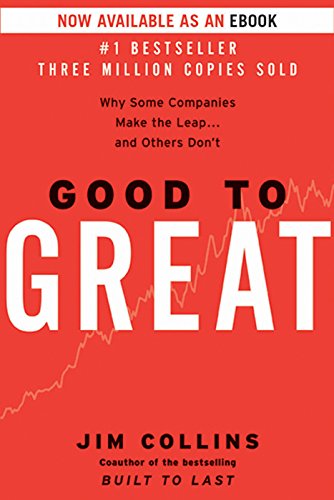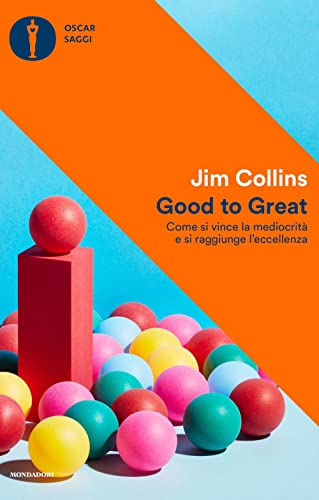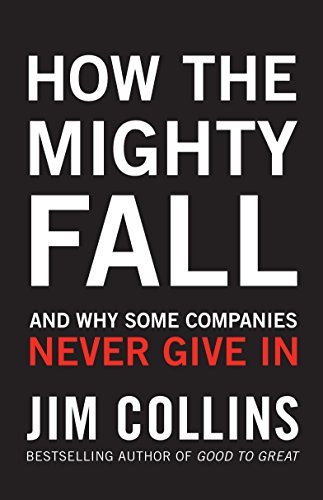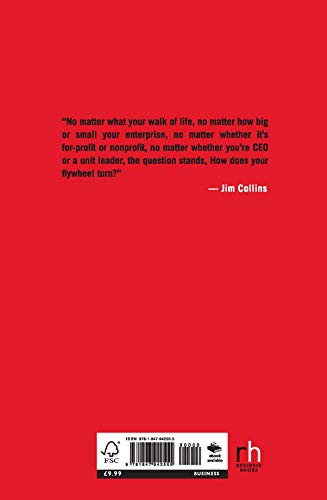Questa è la pagina dedicata a Jim Collins.
In questa pagina troverai 5 prodotti, tra cui “Turning the Flywheel: A Monograph to Accompany Good to Great”.
Good to Great: Why Some Companies Make the Leap…And Others Don’t (English Edition)
The Challenge Built to Last, the defining management study of the nineties, showed how great companies triumph over time and how long-term sustained performance can be engineered into the DNA of an enterprise from the verybeginning. But what about the company that is not born with great DNA? How can good companies, mediocre companies, even bad companies achieve enduring greatness? The Study For years, this question preyed on the mind of Jim Collins. Are there companies that defy gravity and convert long-term mediocrity or worse into long-term superiority? And if so, what are the universal distinguishing characteristics that cause a company to go from good to great? The Standards Using tough benchmarks, Collins and his research team identified a set of elite companies that made the leap to great results and sustained those results for at least fifteen years. How great? After the leap, the good-to-great companies generated cumulative stock returns that beat the general stock market by an average of seven times in fifteen years, better than twice the results delivered by a composite index of the world’s greatest companies, including Coca-Cola, Intel, General Electric, and Merck. The Comparisons The research team contrasted the good-to-great companies with a carefully selected set of comparison companies that failed to make the leap from good to great. What was different? Why did one set of companies become truly great performers while the other set remained only good? Over five years, the team analyzed the histories of all twenty-eight companies in the study. After sifting through mountains of data and thousands of pages of interviews, Collins and his crew discovered the key determinants of greatness — why some companies make the leap and others don’t. The Findings The findings of the Good to Great study will surprise many readers and shed light on virtually every area of management strategy and practice.
Good to Great. Come si vince la mediocrità e si raggiunge l’eccellenza
Può un’azienda buona ma nella media trasformarsi in una grande azienda? Se sì, come? Quali caratteristiche permettono di uscire dalla mediocrità e raggiungere l’eccellenza? E soprattutto: come applicare alla vita quotidiana le strategie individuate nell’ambito dell’economia aziendale? Per rispondere a queste domande il noto economista Jim Collins, una tra le 100 menti più brillanti del settore secondo «Forbes», ha intrapreso insieme alla sua équipe una ricerca metodica e approfondita su migliaia di società, per arrivare a identificare, non senza alcune sorprese, i fattori che determinano la differenza. Rimasto per anni nella classifica dei bestsellers del «New York Times», con oltre tre milioni di copie vendute, tradotto in decine di lingue e considerato uno dei più importanti libri di economia aziendale mai scritti, Good to Great affianca all’ampia mole di dati analizzati uno stile vivace e piacevole, per insegnare come i piccoli Davide possano diventare più forti dei giganti Golia.
Opinioni:
Rimasto per anni nella classifica dei bestsellers del «New York Times», considerato uno dei più importanti libri di economia aziendale mai scritti, Good to Great affianca all’ampia mole di dati analizzati uno stile vivace e piacevole, per insegnare come i piccoli Davide possano diventare più forti dei giganti Golia. – LaFeltrinelli
How the Mighty Fall: And Why Some Companies Never Give In
Decline can be avoided. Decline can be detected. Decline can be reversed. Amidst the desolate landscape of fallen great companies, Jim Collins began to wonder: How do the mighty fall? Can decline be detected early and avoided? How far can a company fall before the path toward doom becomes inevitable and unshakable? How can companies reverse course? In How the Mighty Fall, Collins confronts these questions, offering leaders the well-founded hope that they can learn how to stave off decline and, if they find themselves falling, reverse their course. Collins’ research project-more than four years in duration-uncovered five step-wise stages of decline: Stage 1: Hubris Born of Success Stage 2: Undisciplined Pursuit of More Stage 3: Denial of Risk and Peril Stage 4: Grasping for Salvation Stage 5: Capitulation to Irrelevance or Death By understanding these stages of decline, leaders can substantially reduce their chances of falling all the way to the bottom. Great companies can stumble, badly, and recover. Every institution, no matter how great, is vulnerable to decline. There is no law of nature that the most powerful will inevitably remain at the top. Anyone can fall and most eventually do. But, as Collins’ research emphasizes, some companies do indeed recover-in some cases, coming back even stronger-even after having crashed into the depths of Stage 4. Decline, it turns out, is largely self-inflicted, and the path to recovery lies largely within our own hands. We are not imprisoned by our circumstances, our history, or even our staggering defeats along the way. As long as we never get entirely knocked out of the game, hope always remains. The mighty can fall, but they can often rise again.
Great by Choice: Uncertainty, Chaos and Luck – Why Some Thrive Despite Them All
Turning the Flywheel: A Monograph to Accompany Good to Great
__________________ *From the author of the multi-million-copy bestseller Good to Great* ‘No matter what your walk of life, no matter how big or small your enterprise, no matter whether it’s for-profit or nonprofit, no matter whether you’re CEO or a unit leader, the question stands, How does your flywheel turn?’ – JIM COLLINS __________________ The key to business success is not a single innovation or one plan. It is the act of turning the flywheel, slowly gaining momentum and eventually reaching a breakthrough. Building upon the flywheel concept introduced in his groundbreaking classic Good to Great, Jim Collins teaches readers how to create their own flywheel, how to accelerate the flywheel’s momentum, and how to stay on the flywheel in shifting markets and during times of turbulence. Combining research from his Good to Great labs and case studies from organisations like Amazon, Vanguard, and the Cleveland Clinic which have turned their flywheels with outstanding results, Collins demonstrates that successful organisations can disrupt the world around them – and reach unprecedented success – by employing the flywheel concept.
Se volessi saperne di più, dai un’occhiata al nostro canale Youtube!
- Libri sul Retail Design migliori da leggere e consigliati
- Libri sul trattato di Verdun Migliori da leggere e consigliati
- Riviste di arredamento Migliori da leggere e consigliate
- Migliori Libri di Paula Hawkins | Romanzi di Paula Hawkins daleggere
- Libri di letteratura Estone Migliori da leggere e consigliati














Lascia un commento
Devi essere connesso per inviare un commento.